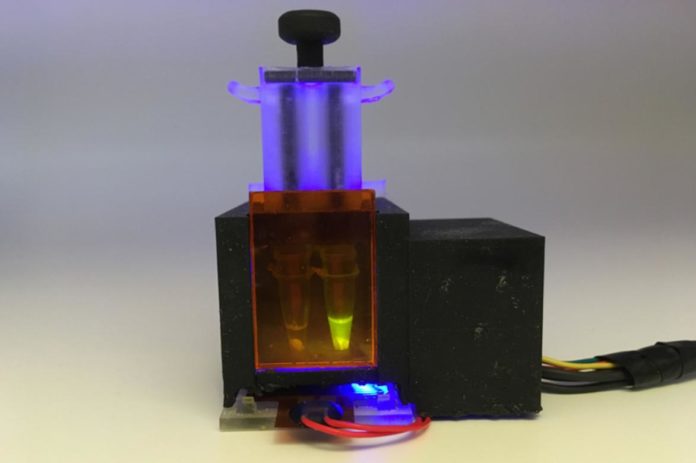MIT and Harvard University engineers have developed a small tabletop device that can detect SARS-CoV-2 from a saliva sample in about an hour. They demonstrated in a new study that the diagnostic is just as accurate as the current PCR tests.
The device can also be used to look for specific viral mutations linked to some of the current SARS-CoV-2 variants. This result can also be obtained in under an hour, potentially making it much easier to track different virus variants, especially in areas where genetic sequencing facilities are not available.
- Brief Anger Hampers Blood Vessel Function Leading to Increased Risk of Heart Disease and Stroke – New Study
- New Blood Test Pinpoints Future Stroke Risk – Study Identifies Inflammatory Molecules as Key Biomarker
- Enceladus: A Potential Haven for Extraterrestrial Life in its Hidden Ocean Depths
- New Experiment: Dark Matter Is Not As ‘DARK’ As All We Think
- Scientists in Fear of This New Predator From Red Sea Eating Native Species in Mediterranean
The new test kit is based on SHERLOCK, a CRISPR-based tool first reported by Collins and colleagues in 2017. An RNA guide strand detects specific target RNA sequences, and Cas enzymes cleave those sequences and produce a fluorescent signal, are among the system’s components. All of these molecular components can be freeze-dried and reactivated when exposed to water for long-term storage.
Last year, Collins’ lab began adapting this technology to detect the SARS-CoV-2 virus in the hope of developing a diagnostic device capable of producing rapid results and requiring little or no expertise to operate. They also wanted it to work with saliva samples, which would make it even more convenient for users.
To accomplish this, the researchers needed to include a critical pre-processing step that inhibits salivary nucleases, which degrade nucleic acids such as RNA. Once the sample is placed in the device, heat and two chemical reagents are used to inactivate the nucleases. Then, by passing the saliva through a membrane, the viral RNA is extracted and concentrated.
This RNA sample is then incubated with freeze-dried CRISPR/Cas components that are activated via automated puncturing of sealed water packets within the device. The one-pot reaction first amplifies the RNA sample and then detects the presence of the target RNA sequence.
“Our goal was to create an entirely self-contained diagnostic that requires no other equipment,” says Xiao Tan, one of the authors of the study. “Essentially the patient spits into this device, and then you push down a plunger and you get an answer an hour later.”
The device, dubbed minimally instrumented SHERLOCK (miSHERLOCK) by the researchers, can have up to four modules, each looking for a different target RNA sequence. The initial module contains RNA guide strands capable of detecting any SARS-CoV-2 strain. Other modules are specific to mutations associated with recent variants such as B.1.1.7, P.1, and B.1.351.
Although the Delta variant was not yet widespread when the researchers conducted this study, they believe it should be simple to design a new module to detect it because the system is already in place. The system could also be easily programmed to keep an eye out for new mutations that could make the virus more contagious.
“If you want to do more of a broad epidemiological survey, you can design assays before a mutation of concern appears in a population, to monitor for potentially dangerous mutations in the spike protein,” says Devora Najjar, another author of the study.
- Brief Anger Hampers Blood Vessel Function Leading to Increased Risk of Heart Disease and Stroke – New Study
- New Blood Test Pinpoints Future Stroke Risk – Study Identifies Inflammatory Molecules as Key Biomarker
- Enceladus: A Potential Haven for Extraterrestrial Life in its Hidden Ocean Depths
- New Experiment: Dark Matter Is Not As ‘DARK’ As All We Think
- Scientists in Fear of This New Predator From Red Sea Eating Native Species in Mediterranean
“The ability to detect and track these variants is essential to effective public health, but unfortunately, variants are currently diagnosed only by nucleic acid sequencing at specialized epidemiological centers that are scarce even in resource-rich nations,” says lead author of the study Helena de Puig.
Image Credit: Devora Najjar
